Appreciative Inquiry Training Course In United Kingdom
Our corporate training course is also available in London, Birmingham, Manchester, Glasgow, Liverpool, Leeds, Sheffield, Edinburgh, Bristol, Newcastle upon Tyne, Belfast, Leicester, Nottingham, Coventry, Sunderland, Brighton and Hove, Plymouth, Wolverhampton, Southampton, Reading, Derby, Dudley, Northampton, Portsmouth, Luton, Preston, Aberdeen, Swansea, Milton Keynes, Cardiff, Oxford, Cambridge, Bath, and York.
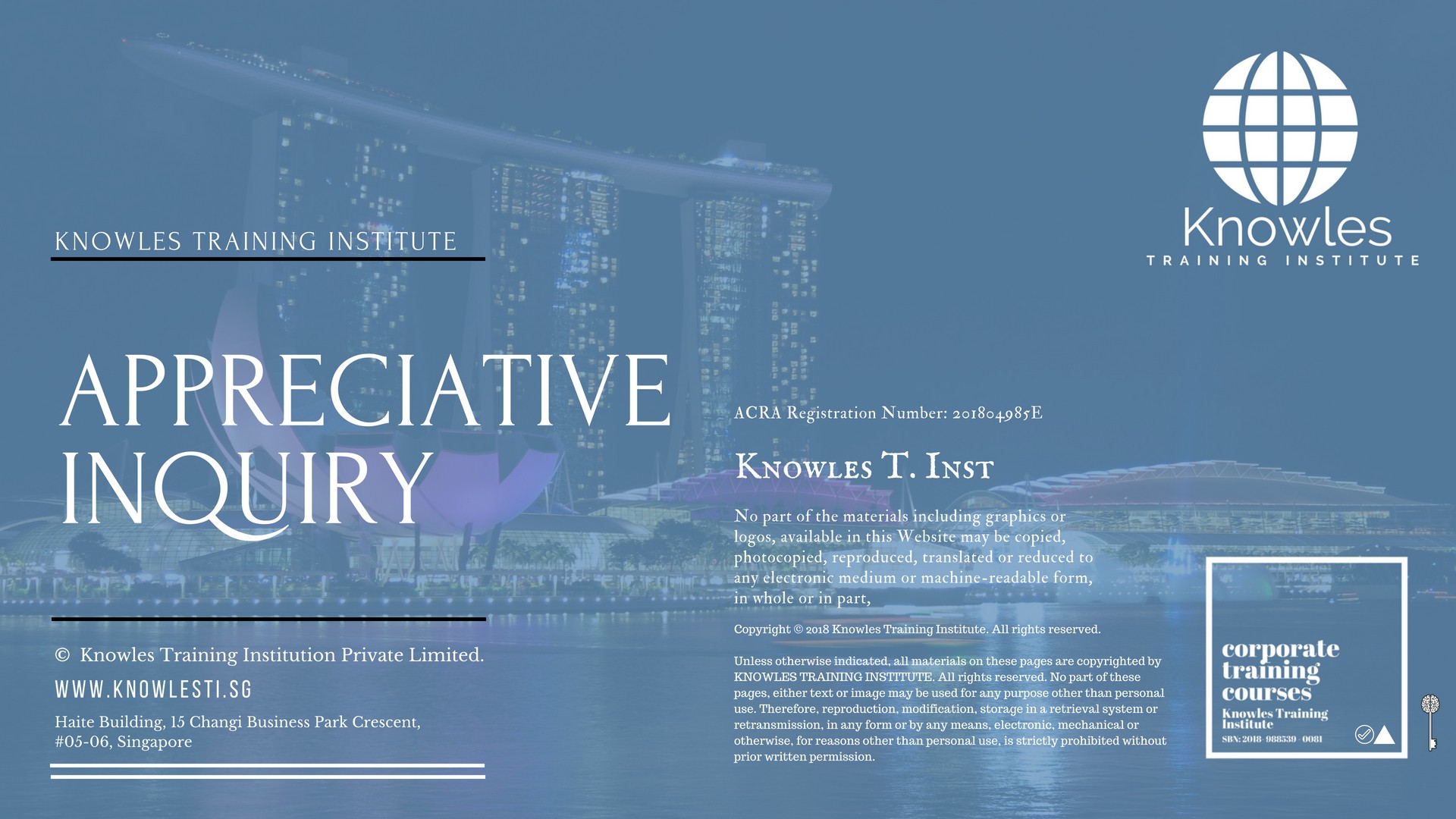
About This Appreciative Inquiry Training Course in United Kingdom
Appreciative Inquiry Course in United Kingdom
When it seems like everything in your organisation is going wrong, it is tempting to get bogged down by problems and be disheartened. By using the Appreciative Inquiry (AI), issues could turn around with just a shift in mindset. In this appreciative inquiry course, find out how an appreciative approach could be a game-changer in the way you handle setbacks in your organisation.
Appreciative inquiry centres on finding the best in people and how they use it to perform in their work and everyday life. Through appreciative inquiry, an employer uses questions and views to strengthen the system as a whole, creating a more positive atmosphere and increasing employee potential. This appreciative inquiry training will help anyone that leads change and wants to generate positive dialogue that leads to improvements within their company.
Who Should Attend This Appreciative Inquiry Course in United Kingdom Workshop
This Appreciative Inquiry Course in United Kingdom workshop is ideal for anyone who would like to gain a strong grasp and improve their Appreciative Inquiry.
All Staff Within An Organisation
Managers
Team Leaders
Executives
Assistants
Officers
Secretaries
Group Size For This Appreciative Inquiry Training Program in United Kingdom
The ideal group size for this Appreciative Inquiry course in United Kingdom is:
Minimum: 5 Participants
Maximum: 15 Participants
Course Duration For This Appreciative Inquiry Skills Course in United Kingdom
The duration of this Appreciative Inquiry course in United Kingdom workshop is 2 full days. Knowles Training Institute United Kingdom will also be able to contextualised this workshop according to different durations; 3 full days, 1 day, half day, 90 minutes and 60 minutes.
2 Full Days
9 a.m to 5 p.m
Appreciative Inquiry Course in United Kingdom Benefits
Below is the list of course benefits of our Appreciative Inquiry course in United Kingdom
Appreciative Inquiry Training Course in United Kingdom Benefits- Part 1
- Accelerated change that concentrates on what you want to build rather of trying to erase what you don’t want.
- Interactive conversations focused on positive change produces a personal commitment to development and fosters relationship building.
Appreciative Inquiry Training Course in United Kingdom Benefits- Part 2
- Grounding the experiences in the company’s past achievements and values encourages hope and new possibilities.
- Increased morale, engagement, curiosity, and communication enhance retention.
Appreciative Inquiry Training Course in United Kingdom Benefits- Part 3
- A positive environment for change boosts creativity, open dialogue, and new solutions.
- Inclusion of stakeholders promotes buy-in, accountability, and individual commitment.
Appreciative Inquiry Course in United Kingdom Objectives
Below is the list of course objectives of our Appreciative Inquiry course in United Kingdom.
Appreciative Inquiry Course in United Kingdom Objectives- Part 1
- Define Appreciative Inquiry.
- State how to change the way you think.
- List the Four D model.
- Explain the Four I Model.
Appreciative Inquiry Course in United Kingdom Objectives- Part 2
- Explain the Appreciative interview style.
- Describe ways to solicit positive stories.
- Identify and recognise positive attributes in people.
- Identify the anticipatory realities of Appreciative Inquiry.
Appreciative Inquiry Course in United Kingdom Objectives- Part 3
- Illustrate the power of positive imagery.
- Discuss how to Influence change through Appreciative Inquiry.
- Demonstrate how you would coach and manage with Appreciative Inquiry.
- Recognise ways to create a positive core.
Course Content For This Appreciative Inquiry Training Course in United Kingdom
Below is the list of course content of our Appreciative Inquiry training course in United Kingdom
Appreciative Inquiry Course in United Kingdom – Part 1
- What is Appreciative Inquiry?
- The definition of appreciative inquiry is the way of recognising the best in people and employing those strengths to find new possibilities and results. Appreciative inquiry concentrates on positive thinking and expresses ideas and opinions to reach a conclusion.
- Generating a Better Future
- Appreciative inquiry assists build a vision for a better future by using questions to utilise the person’s attention to their past, present and future accomplishments.
- Engaging People in Positive Thought
- One of the age-old methods of ascertaining how a person sees a circumstance is asking them if the glass is half full or half empty. Many pessimists will respond that the glass is half empty while opportunists will see the glass as half full. Even one pessimist in the group can hinder everyone else’s positive outlook, so it is essential to engage every employee in positive thinking.
Appreciative Inquiry Course in United Kingdom – Part 2
- Change the Person, Change the Organization
- When employees take pride in themselves, they also take pride in their company. But if they have negative sentiments about where they work, it can show in their productivity. When you alter how a person views or assumes about the company and their positions in it, you in turn change how the company is perceived as a whole.
- Shifting from “What”s Wrong?” to “What”s Right”?
- One of the principal elements that can ruin a positive outlook is looking at a situation and only noticing the negative features, or the “What’s Wrong” side. Since the main focus of the appreciative inquiry is being positive and striving towards goals, a pessimistic view won’t get anyone very far.
- It’s Not Eliminating Mistakes, It’s Holding Up Successes
- A popular misconception that people make is that being positive or advancing means they cannot make errors nor have faults. This, of course, is incorrect. Mistakes occur all the time, and although they can sometimes be prevented, they cannot be stopped altogether.
Appreciative Inquiry Course in United Kingdom – Part 3
- Positive Language Will Affect Peoples Thinking
- From a tender age, we have learned that positive communication has more impact on us than negativity. When we tell ourselves “I can’t do that” or “I’ll never finish this”, we usually find ourselves to be right. But if we use more positive and substantial expressions and language, we find ourselves feeling more confident and equipped to handle any situation.
- Limit or Remove Negative Phrasing
- As we’ve stated before, positive messages promote positive thinking. The same goes for negative phrasing – when we permit ourselves to use negative communication, our thoughts become negative.
- The Discovery Process of Appreciative Inquiry
- Discovery is about determining what type of processes, organisation and abilities work for you and will assist you along your way. It is also a method of learning to appreciate what has been provided to us and utilising it to our advantage. Employees usually discover some of this knowledge by conversing with other employees and learning about what has worked for the business in the past.
Appreciative Inquiry Course in United Kingdom – Part 4
- The Dream Phase of Appreciative Inquiry
- The dream phase concentrates on what would work for yourself and the company in the future. This ‘dream session’ can be covered in a big group discussion or can be achieved with a few peers. Either way, it should enable everyone to open up about what they want to see from the company and any ideas they may have for improvement.
- The Design Plan of Appreciative Inquiry
- The design plan is regarding how you and the company intend to reach the goals and visions that were lined out in the discovery and dream phases. This part of the model concentrates on what needs to be done to achieve these goals and reach the required progress. Generally, this part is carried out by a small group of members that concentrate on how to move ahead, but it can be arranged with larger groups as well.
- The Delivery Phase of Appreciative Inquiry
- The delivery phase, sometimes termed the destiny phase, is the last stage of the Four D model and focuses on administering the plans and notions that were thought out and developed in the previous phases. In this part of the model, employees need to take the required actions to advance toward change and positively achieving their goals.
Appreciative Inquiry Course in United Kingdom – Part 5
- The Initiate Phase of Appreciative Inquiry
- In the initiate phase, people are introduced to the Appreciative Inquiry theory and how it can help in the company. This phase is essential to develop planning and strategies. It debuts new plans and ideas the employees have about the company and what can be improved upon (or even changed).
- The Inquire Phase of Appreciative Inquiry
- The Inquire phase aims to help employees begin to develop a plan or course of action to create the plans in the Initiate phase. Also called ‘the interview’ stage, this part of the plan entails a lot of communicating between employees, managers, and higher-ups. People are urged to share their ideas and visions which can be utilised as valuable input.
- The Imagine Part of Appreciative Inquiry
- The Imagine part of the plan concentrates on creating a route of action for all of the ideas and brainstorms previously received. Its purpose is to conclude what needs to be done and how it can be carried out. Once a stable vision has been designed, it can be shared with other employees to guarantee their participation.
Appreciative Inquiry Course in United Kingdom – Part 6
- The Innovate Phase of Appreciative Inquiry
- Finally, using Appreciative Inquiry, the action plan can be put into place and carried out according to its design. Employees may be apprehensive or sceptical at first, but this is where the positive communication and attitudes are put to the test. Every person has a purpose and should take the steps required to carry out their part of the plan.
- Framing Positive Questions
- When we ask questions to the interviewee, what kind of response are we expecting? If we ask questions that can come across as negative or critical, we can expect that kind of result. But by using positive communication to form more positive questions, we can not only put the other person at ease, but they will feel more confident about their capabilities and be able to have a better interview.
- Solicit Positive Stories
- If you open an interview detailing how the last employee abruptly quit and left a pile of work for everyone else to do, the interviewee does not have a very positive outlook on the company from the start. Instead, begin the interview with a positive experience and describe positive events that have occurred. When using positive questions, have the interviewee share their positive experiences and personal attributes.
Appreciative Inquiry Course in United Kingdom – Part 7
- Finding Out What Works
- When we interview an employee, we already have a notion of the attributes and skills required for the position. We know what it takes when working for the company and what features should be possessed by the employee. However, there is always more than one way to utilise these skills and put them to good use.
- Recognize the Reoccurring Themes
- When interviewing and sharing stories with someone, recognise the reoccurring themes that each person shares. Look for a pattern in what they have experienced and accomplished and what they have in common. Some of the common themes you may hear include commitment, expertise, trust, etc.
- Imagining a Successful Future Will Affect the Present
- We know that our past does not always identify our future. But planning our future can influence our present. Thinking ahead to our successful future can increase our positivity in our lives today and raise our morale. When we focus on the successes we want to accomplish and imagine them coming true, it can give us great hope for the future, which in turn gives us hope for today.
Appreciative Inquiry Course in United Kingdom – Part 8
- Controlling Negative Anticipation
- Many of us are the type of people who automatically assume the worst in any circumstance. We start to envision anything that can go wrong and try to determine how we would manage anything that comes up. But if we learn to control these negative preconceptions, we can begin to see any situation from the positive side.
- Current Decisions Will Be Influenced Positively
- The decisions we make today can impact how we view things later. When we restrict our negative anticipations and concentrate on constructing a positive outlook, our current choices and thoughts begin to evolve into a positive form of thinking, which can improve our overall morale. Fretting about what may or may not occur or what could go wrong in a situation can drain our bodies and make us feel as though we don’t have any hope.
- Base It on Data and Real Examples
- One of the negative things about anticipatory actuality is that we often base our opinions and views on things that we have heard or have over-played in our own heads. We begin to think about the worst thing that could occur or anything that could go wrong, but we have nothing to base it upon. Instead, we should always focus on the facts of a problem and realize what is actually there.
Appreciative Inquiry Course in United Kingdom – Part 9
- Shaping Performance with Positive Imagery
- Positive imagery can usually serve as not only a token of good work, but it can also serve as a reward. You should see an increase in performance and productivity through the application of positive imagery. Some physical forms of positive imagery include a shiny trophy after a race or a chart of how many merchandises you sold last month.
- Being Better Prepared for Adversity
- Being positive does not mean that you are unaware of the outside world and the things that can go wrong in it. But, being positive does signify that you can be equipped for the worst but retaining a positive outlook for everything else. Being prepared for adversity simply means that you do not lie to yourself about what can occur and that you see the situation for what it is.
- People are More Flexible and Creative
- When a problem is presented before you, chances are, you cannot change what has already occurred or the effect of the problem on everyone else. But you as a person are more adaptable and creative and have the ability to manipulate how you view a problem and how to solve it. Realize that you have options and that you can control how you respond to something.
Appreciative Inquiry Course in United Kingdom – Part 10
- Think of the Perfect Situation
- When we perceive something as perfect, we generally see something that is free of imperfections and makes us happy. Sometimes when we have a large group of problems, we have trouble determining what to start on first. When this happens, a helpful exercise is to think about the perfect situation.
- Using Strengths to Solve Challenges
- Every problem or challenge is different. Some of them we can manage on our own. Some of them require guidance from others. Whatever the case, we know that we can solve the problem the best way we know how by utilising our inner strengths.
- Confidence Will Promote Positive Change
- The perception you have of yourself not only influences how other people see you, but it can alter how you view the world and act in it. Sometimes we can’t control these things, such as embarrassing moments or recent mistakes, but there are many things we can do that can boost our morale. When we remember our earlier successes or imagine a goal we want to achieve, we get an instant confidence boost and can feel better about the decisions we make.
Appreciative Inquiry Course in United Kingdom – Part 11
- Inquiry is a Seed of Change
- Many things in our lives have evolved so much and continue to grow over time. But what makes them change? What actions do they take to make something different? We’d be astonished to know that the simplest way to make changes is to ask a question.
- People Will Gravitate Towards What is Expected of Them
- When you look for a job availability in the want ads, what type of ads do you regard first? Odds are you read the ones that mention your type of skill sets, such as an administrator, a chef, or even a construction worker. You feel confident viewing these ads first because you know that they are in your area of abilities and you’re confident you can do the job.
- Build Around What Works
- When we analyse how our business is run, we notice what functions and works for everyone, and what doesn’t. The key to a well-managed team is building around what works and encouraging growth with it. As managers or leaders, we can try to change things that derail our employees from what they usually do.
Appreciative Inquiry Course in United Kingdom – Part 12
- Focus on Increases
- As a leader, we often negatively view our task list. One of the main things we try to achieve is to decrease certain areas, such as blunders, tardiness, and complaints. But concentrating on what we want to decrease regularly includes negative attributes of the job.
- Recognize the Best in People
- Another aspect of being positive is being equipped to perceive the best in people instead of being critical. Of course, no one is perfect and everyone has some kind of fault, but that does mean we have to distinguish them by it. When we recognize the best in people, not only do we benefit from knowing what great attributes they can contribute, but it makes the employees feel more confident about themselves and their job skills.
- Limit or Remove Negative Comments
- Using negative expressions and phrases is one of the principal causes of unsatisfactory performance and low employee morale. These harsh words can damage any employee relationship and can often bring out a feeling of defensiveness when approached. When you notice yourself wanting to use negative phrases, either with yourself or an employee, pause and think of the words you’re using.
Appreciative Inquiry Course in United Kingdom – Part 13
- Identifying Strengths
- Recognizing our strengths can give us an instantaneous confidence boost because it reminds ourselves of things we can do that are really great. But sometimes when we don’t regard our strengths right away, we assume that we don’t have any, or worse, downplay the ones we do possess. A common exercise to find our strengths involves making a list of everything that we are good at.
- Best Practices
- Sometimes the term ‘best practices’ can seem confusing if we don’t attribute them to something. In Appreciative Inquiry, best practices refer to the practices that work best for you and what work best for the company.
- Peak Experiences
- Peak experiences are generally defined as moments in which we feel the highest levels of happiness and possibility. They can happen in everyday situations or during extreme events in our lives. They can happen when we achieve a new goal or finish a long project.
- Remembering Successes
- Sometimes personal modesty can keep us from perceiving our own successes, which can keep us from feeling fully confident or self-assured. Our past successes are often viewed as our roots or the areas that be started from and built upon to progress forward. We often neglect to utilise these successes to remind us what it took to get us to our personal level of accomplishments.
Appreciative Inquiry Course in United Kingdom Value Added Materials
Each participant will receive the following materials for the Appreciative Inquiry course in United Kingdom
Appreciative Inquiry Training Course in United Kingdom Learner’s Guide
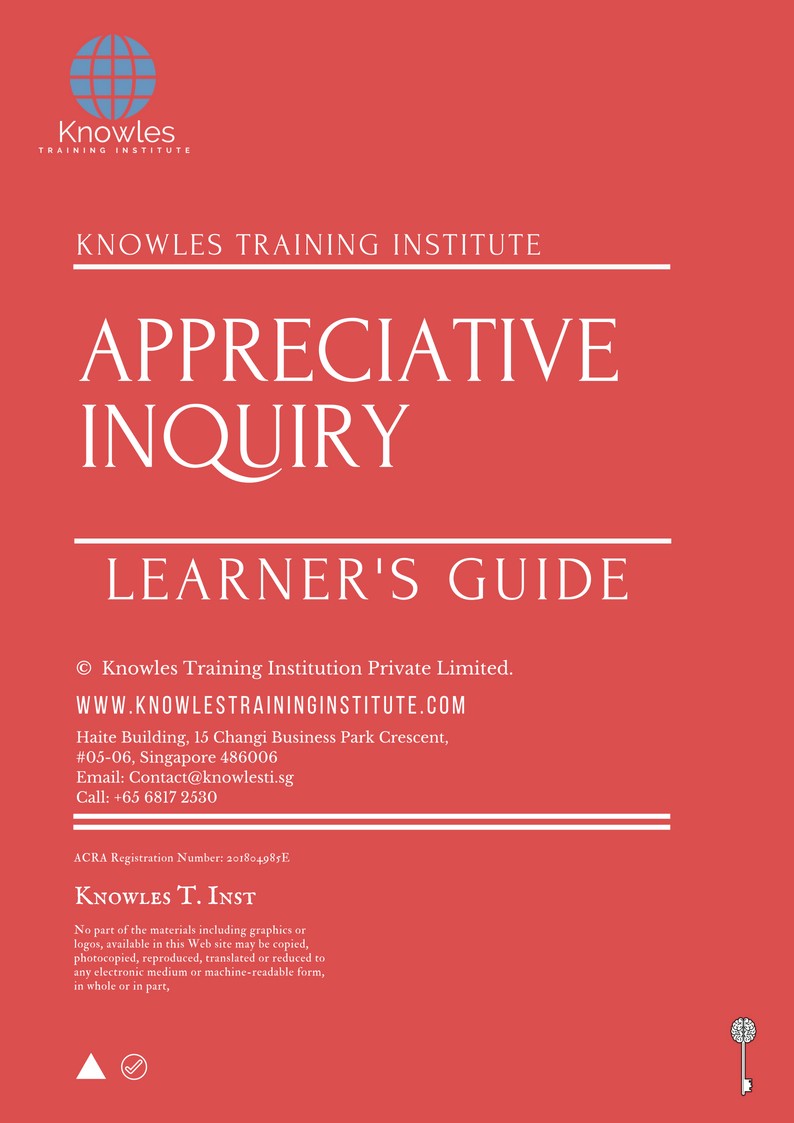
Appreciative Inquiry Training Course in United Kingdom Course Handouts
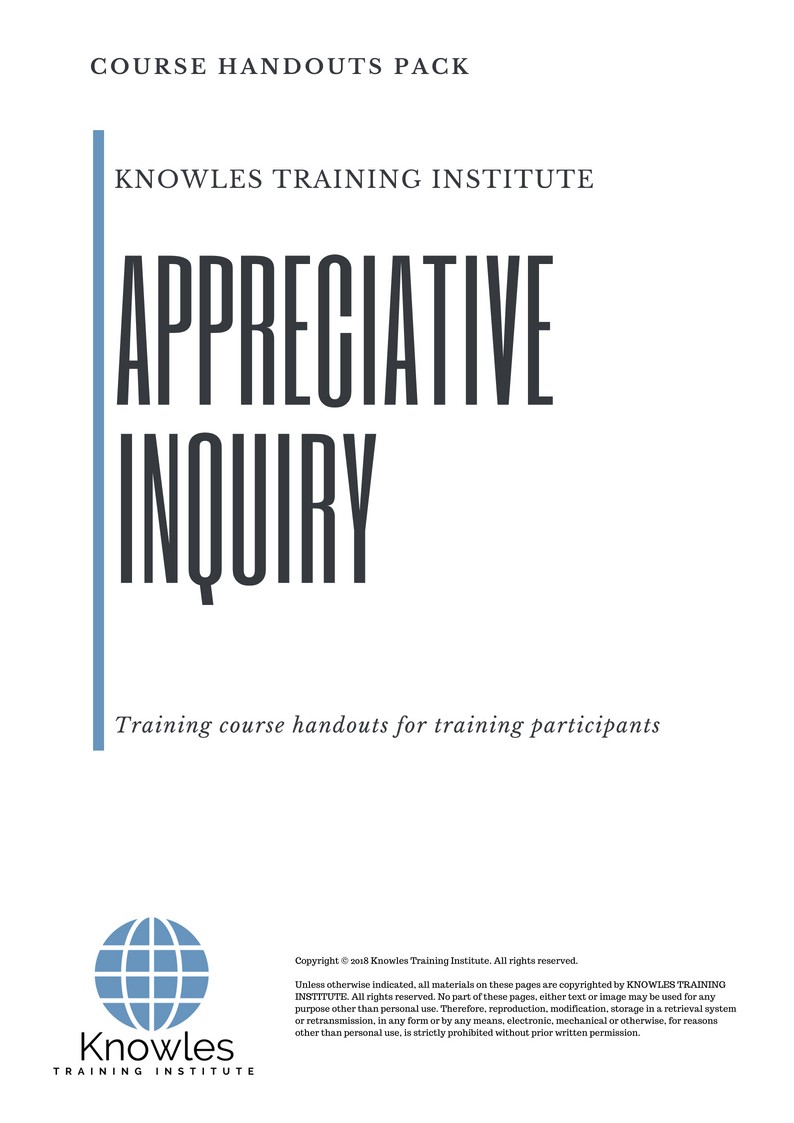
Appreciative Inquiry Course in United Kingdom PPT Slides Used During Course

Appreciative Inquiry Certification
Each course participant will receive a certification of training completion
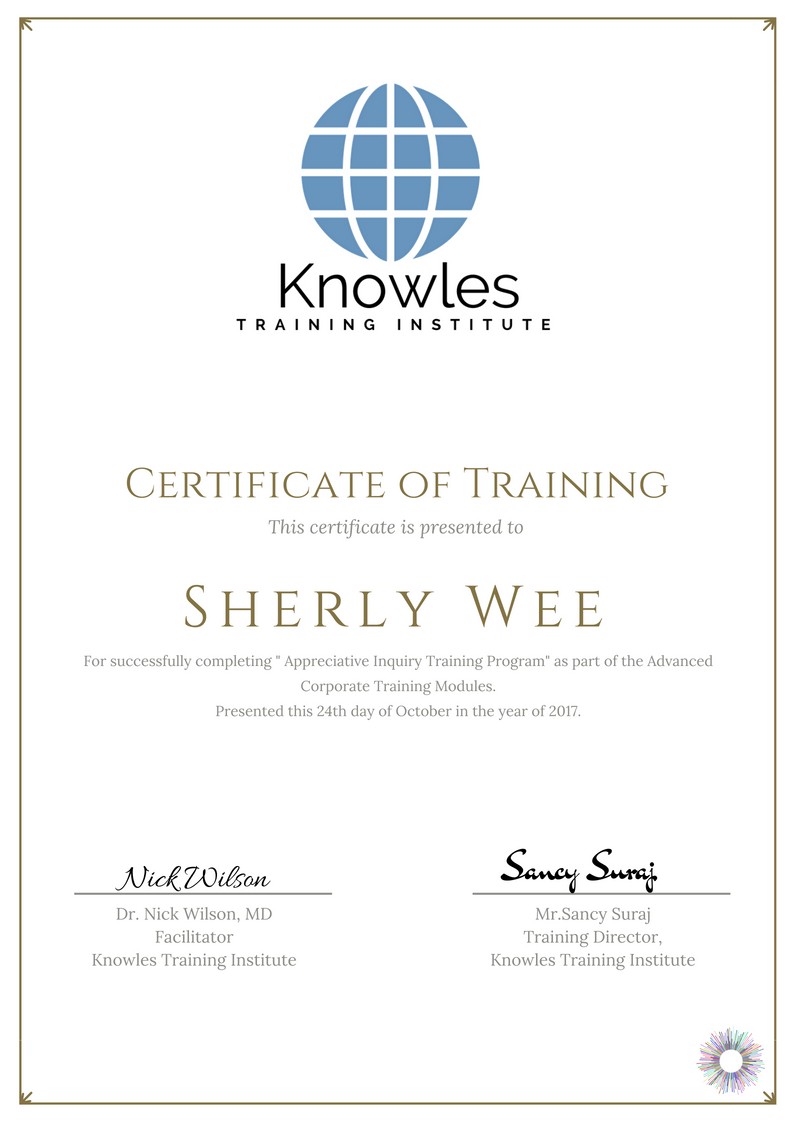
Course Fees For Appreciative Inquiry Training Course in United Kingdom
There are 4 pricing options available for this Appreciative Inquiry training course in United Kingdom. Course participants not in United Kingdom may choose to sign up for our online Appreciative Inquiry training course in United Kingdom.
USD 679.97 For a 60-minute Lunch Talk Session.
USD 289.97 For a Half Day Course Per Participant.
USD 439.97 For a 1 Day Course Per Participant.
USD 589.97 For a 2 Day Course Per Participant.
Discounts available for more than 2 participants.
Upcoming Appreciative Inquiry Training Course in United Kingdom Schedule
Contact us for the latest Appreciative Inquiry course in United Kingdom schedules:
Email: contact@knowlesti.uk
Message:
Download Appreciative Inquiry Course in United Kingdom Brochure

Request for this Appreciative Inquiry course in United Kingdom brochure. Fill up the short information below and we will send it to you right away!
Post Training Support: A vast majority of training does not have any effect beyond 120 days. To work, training has to have a strong pre- and post-training component. Post-training reinforcement helps individuals to recall the understanding and ask questions.
Blended Learning: Learning does not occur in the classroom. Virtually everybody prefers distinct ways of learning. Successful learning should have a multi-channel, multi-modal strategy.
- We Understand The Industry: We’ve got a profound comprehension of the business, business design, challenges, strategy and the that our participants are in and have designed the courseware to cater to their professional needs.
- Course Content: Knowles Training Institute’s material is relevant, of high quality and provide specific learning results. Participants will leave the training course feeling as they have gained a strong understanding and will also be in a position to execute what they have learned sensibly.
Course Development — The workshop modules follow a systematic and logical arrangement. This structure helps to ensure that the course material allows the facilitators to deliver the course in a logical arrangement. Consider the subjects as building bricks into learning, our facilitators slowly build towards a comprehensive picture of this entire topic.
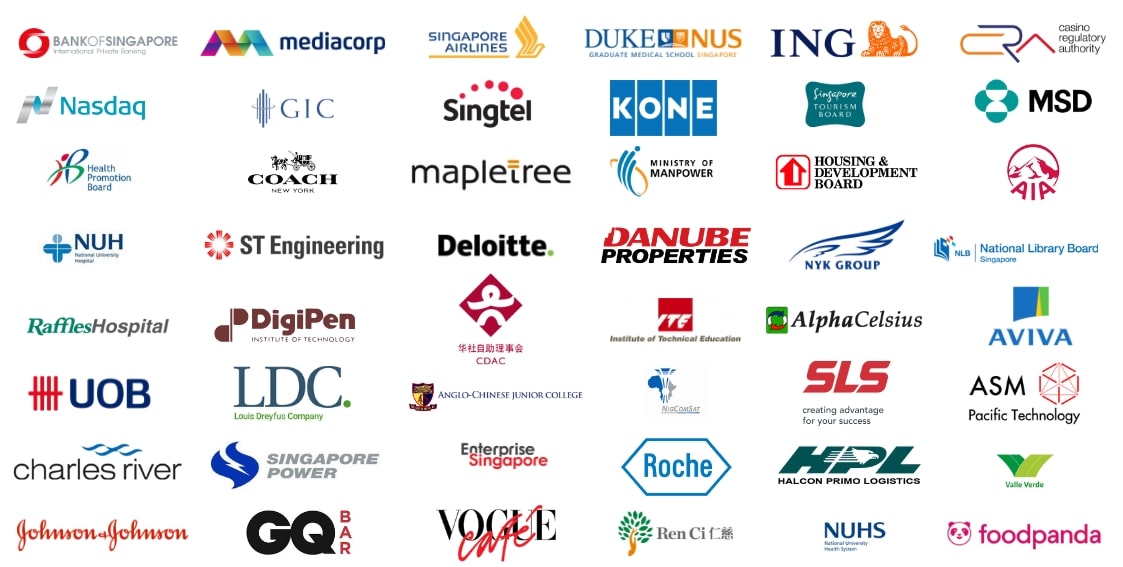

Course Enquiries

Fill up the form and we will get back to you in less than 1 working day.
Alternatively, give us a call to have one of our training consultants contact you. Our corporate training courses can be contextualized to meet your organization’s training needs. Leverage on our large pool of professional trainers and consultants for your organization’s training needs.
Email: contact@knowlesti.uk
We Guarantee 100% Privacy. We Respect Your Privacy. Your Information Will Never Be Shared.


